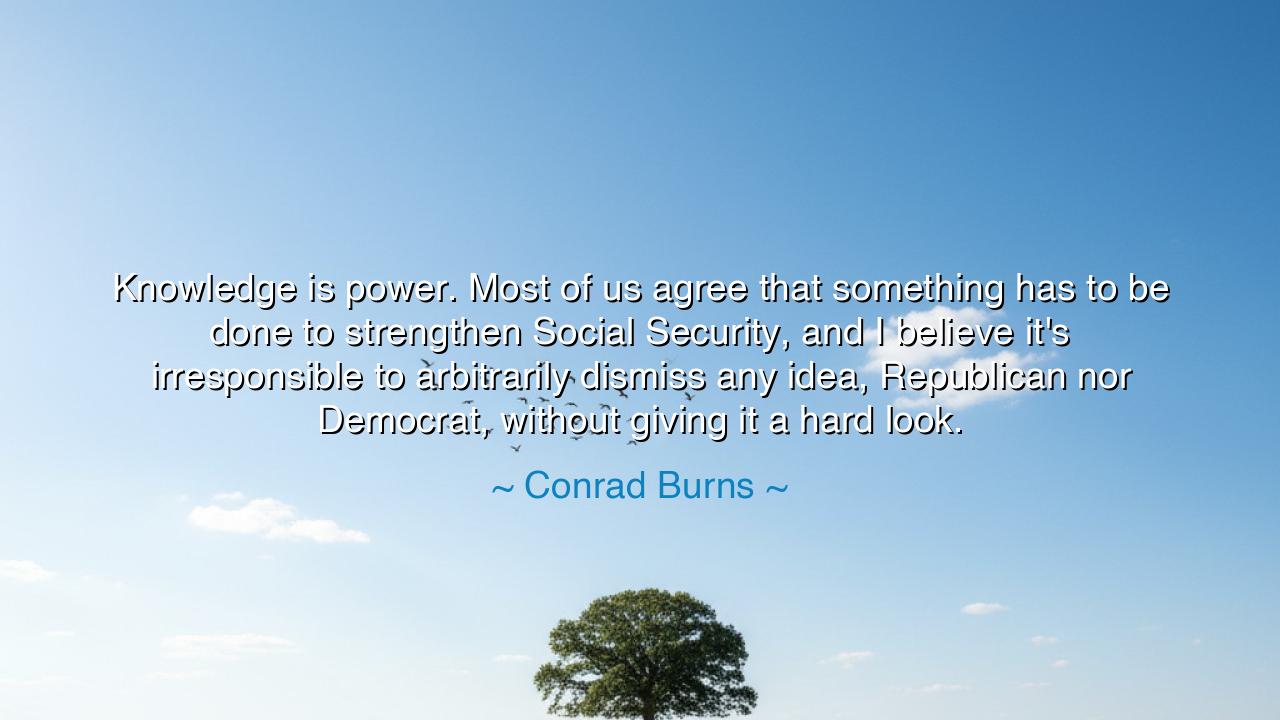
Knowledge is power. Most of us agree that something has to be
Knowledge is power. Most of us agree that something has to be done to strengthen Social Security, and I believe it's irresponsible to arbitrarily dismiss any idea, Republican nor Democrat, without giving it a hard look.






The words of Conrad Burns carry both the wisdom of the old world and the urgency of the new: “Knowledge is power. Most of us agree that something has to be done to strengthen Social Security, and I believe it’s irresponsible to arbitrarily dismiss any idea, Republican nor Democrat, without giving it a hard look.” Though spoken in the arena of politics, these words rise beyond it; they speak to the eternal struggle between wisdom and pride, between reason and division. Knowledge is power, yes—but only when it is united with humility and fairness. For power born of knowledge is meant not to dominate, but to enlighten—to lift nations, to guard justice, and to preserve the dignity of the people.
In the ancient councils of kings and sages, the wise always knew that a ruler’s greatest strength was not his sword, but his understanding. Knowledge guided his decisions, tempered his passions, and gave light to his judgments. Burns, speaking as a servant of the people, calls us back to that same truth: that power without knowledge is reckless, but knowledge without open-mindedness is sterile. His words remind us that in the governance of men, as in the governance of the soul, wisdom demands the humility to listen—even to one’s opponent.
To dismiss an idea arbitrarily—to reject it merely because it bears the mark of another tribe or party—is to choose blindness over vision. Such arrogance has doomed many nations throughout history. The great Roman Republic, which once governed with reason and debate, fell not to foreign invasion, but to the poison of faction and pride. When senators ceased to listen, when every voice was drowned in anger, knowledge no longer served power—it served ambition. Burns’ warning is the echo of that ancient ruin: that a society divided in mind cannot stand in strength.
Consider the story of Abraham Lincoln, who in the midst of civil war gathered around him not only those who agreed with him but those who opposed him. His cabinet was known as the “team of rivals.” He knew that truth is not the possession of one man, nor one party, but is forged in the fires of honest argument. In listening to his adversaries, Lincoln transformed conflict into clarity, and through knowledge, turned division into destiny. Burns’ words flow from the same spirit: that the measure of a leader is not how fiercely he holds his own view, but how wisely he weighs the views of others.
Yet this teaching is not only for those who govern nations—it is for every human heart. For in each of us lies a small republic of thought, a congress of emotions, and a senate of reason. To dismiss ideas without reflection, to cling to prejudice over principle, is to cripple the mind’s power. Knowledge, when joined with openness, becomes the architect of progress. But when chained to pride, it becomes the instrument of stagnation. Thus, the wise must cultivate a listening heart, ever willing to examine, question, and learn.
The power of knowledge is not in its possession, but in its application. It is the bridge between understanding and action, between compassion and justice. When Burns speaks of strengthening Social Security, he invokes more than policy—he calls for stewardship: the duty to protect the weak, to honor the labor of those who built the nation, and to ensure that wisdom guides the care of the people. Such decisions cannot be made in ignorance or arrogance, but only through the patient labor of thought, guided by both intellect and empathy.
O listener, take heed of this ancient principle reborn in modern words: do not despise knowledge, nor close your ears to ideas that challenge you. Truth wears many faces and speaks in many tongues. The wise man does not fear the unknown; he seeks to understand it. When you confront a problem—whether in the world or within your heart—do not reject any path before seeing where it may lead. Examine with honesty, listen with humility, and decide with justice.
For in the end, the teaching of Burns is both simple and profound: Knowledge is power, but only when wielded by a mind that is open and a heart that is fair. The fool rejects what he does not understand; the wise man learns from all. So may we, too, seek the strength of understanding over the weakness of division—and by doing so, build not only better nations, but better souls.






AAdministratorAdministrator
Welcome, honored guests. Please leave a comment, we will respond soon